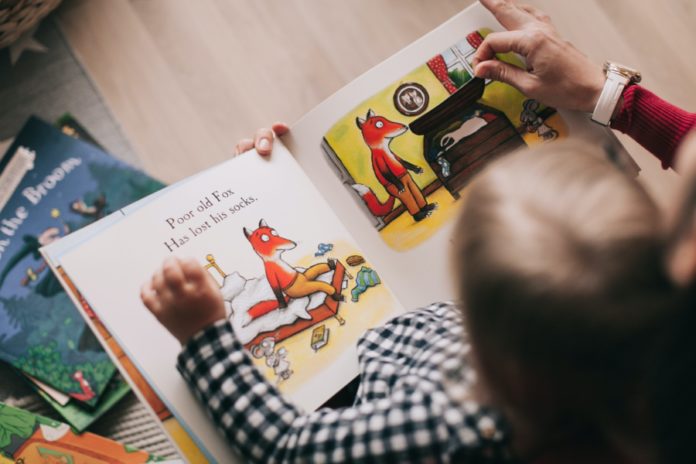A new report has made the shocking finding that 82% of South African kids in Grade 4 can’t read for meaning.
Dr Phumzile Mlambo Ngcuka on Tuesday chaired the 2023 conference of the 2030 Reading Panel, where this statistic was revealed.
The reading panel meets annually to review progress towards all South African children being able to read for meaning by age 10 by 2030, and provides implementable systemic recommendations to government.
Experts say on our current trajectory it will take SA 86 years to reach all children reading for meaning, the year 2108…
At the conference Mlambo Ngcuka said: “When it comes to reading we need massive investment so we can break the back of the problem we have today. We need to invest for the long term and not take short term measures.”
The 2023 background report was presented by Professor Nic Spaull, which includes new research on early grade reading outcomes, promising interventions, existing state plans to improve early grade reading, and recommendations for government.
Key findings of the report:
- 82% of SA Grade 4 kids can’t read, up from 78% pre-pandemic: Before the pandemic it was estimated that 78% of Grade 4 learners could read for meaning (PIRLS 2016), new research based on learning losses in the Western Cape suggests that this has risen to 82% as a result of COVID-19 school closures and rotational timetables.
- It will take SA 86 years on our current trajectory to reach 95% of children reading for meaning, i.e. the year 2108.
- Pandemic has erased a decade of progress, sending us back to 2011. In 2016 22% of Grade 4 children could read for meaning in SA according to PIRLS. Due to COVID-19 it is estimated that now only 18% can read for meaning, the same level as in 2011, erasing a decade of progress in reading outcomes.
- 50% of children in no-fee schools do not learn the letters of the alphabet by the end of Grade 1. New research from Limpopo, the Eastern Cape and the North West published in December 2022 shows that less than 50% of children in no-fee schools learn all the letters of the alphabet by the end of Grade 1.
- There is currently no National Reading Plan and no national budget for reading. Although the Director General has made reference to a ‘National Reading Plan’ in parliament, no such document exists in the public domain or has been seen by stakeholders. There is also no national budget for improving home-language reading.
- Western Cape & Gauteng are both spending more than R100-million over three years to improve reading, the only provinces to do so. The Western Cape is investing in a Reading for Meaning program for Grades 1-3 (2023-2025, R111mil) and Gauteng in their Grade R Program (2022-2024, R107-mil). These are the only provinces to allocate significant budgets to reading (although the Gauteng intervention is 80% donor funded).
- Government has spent over R25-billion on Educator Assistants (EA), 10% of which are Reading Champions. As part of its COVID response the Presidency Youth Employment Initiative (PYEI) has employed over 850,000 youth on temporary contracts costing over R25-billion. It is estimated that 250,000 youth will be appointed in 2023 & approximately 30,000 will be Reading Champions. Although this is a welcome addition, there is currently no face-to-face training for these youth and the only requirement is that they must have passed matric.
- Twice as many children learnt to read in Limpopo after a 2-year intervention with trained teacher assistant and new reading workbooks. A new evaluation of the ‘Funda Wande’ intervention in Limpopo (2021-2022) showed that twice as many children learnt to read in the intervention schools (34%) compared to children in comparable schools who did not receive the intervention (18%), the largest gains seen in SA to date.
Spaull says urgency, courage and leadership is needed to tackle the issue.
“It is clear that we have made no progress on improving reading outcomes since the devastation of the pandemic. Yet despite this generational catastrophe there has been no real plan to catch up learning losses. There is no plan. There is no budget.”
The panel found that almost no progress had been made on the 2022 recommendations and therefore reiterated the four recommendations from 2022 and added two more:
1. Measuring what matters: implementing a universal standardized assessment of reading at the primary school level.
2. Moving from slogans to budgets: allocating meaningful budgets to reading resources and reading interventions not only talking about them.
3. Providing a minimum set of reading resources to all Foundation Phase classrooms (Grade R-3) as a matter of urgency.
4. A university audit of pre-service teacher education programs.
5. To publish a National Reading Plan and the budget for its implementation.
6. To improve the implementation of the Presidential Youth Employment Initiative.
Prof Jonathan Jansen, who serves on the panel, lamented the current state of affairs.
“There is no budget for ECD. There is no budget for reading. This government does not care about the education of the poorest of the poor. And this Thursday the president is going to lie to us again about all the things that aren’t going to happen.”
Another panel member Prof Michael Sachs says government has to take seriously that teachers are the solution, not the problem.
“Next year will be the most significant real cut in the basic education budget in South Africa’s history. This assumes a cut in the real salaries of teachers and the number of teachers in the system.”
ALSO READ: Delft Library uses gaming to promote reading


